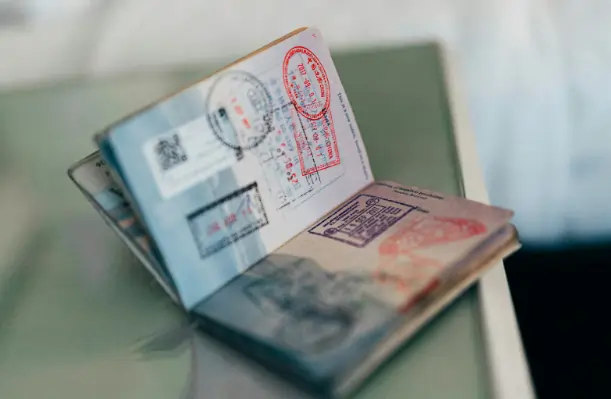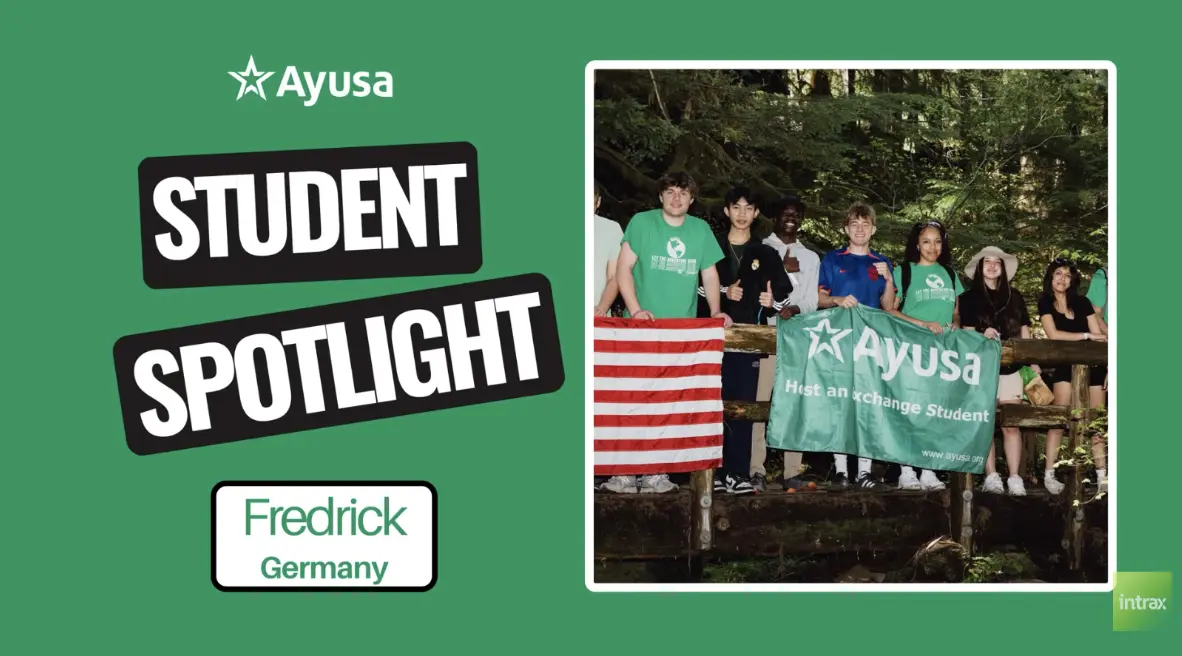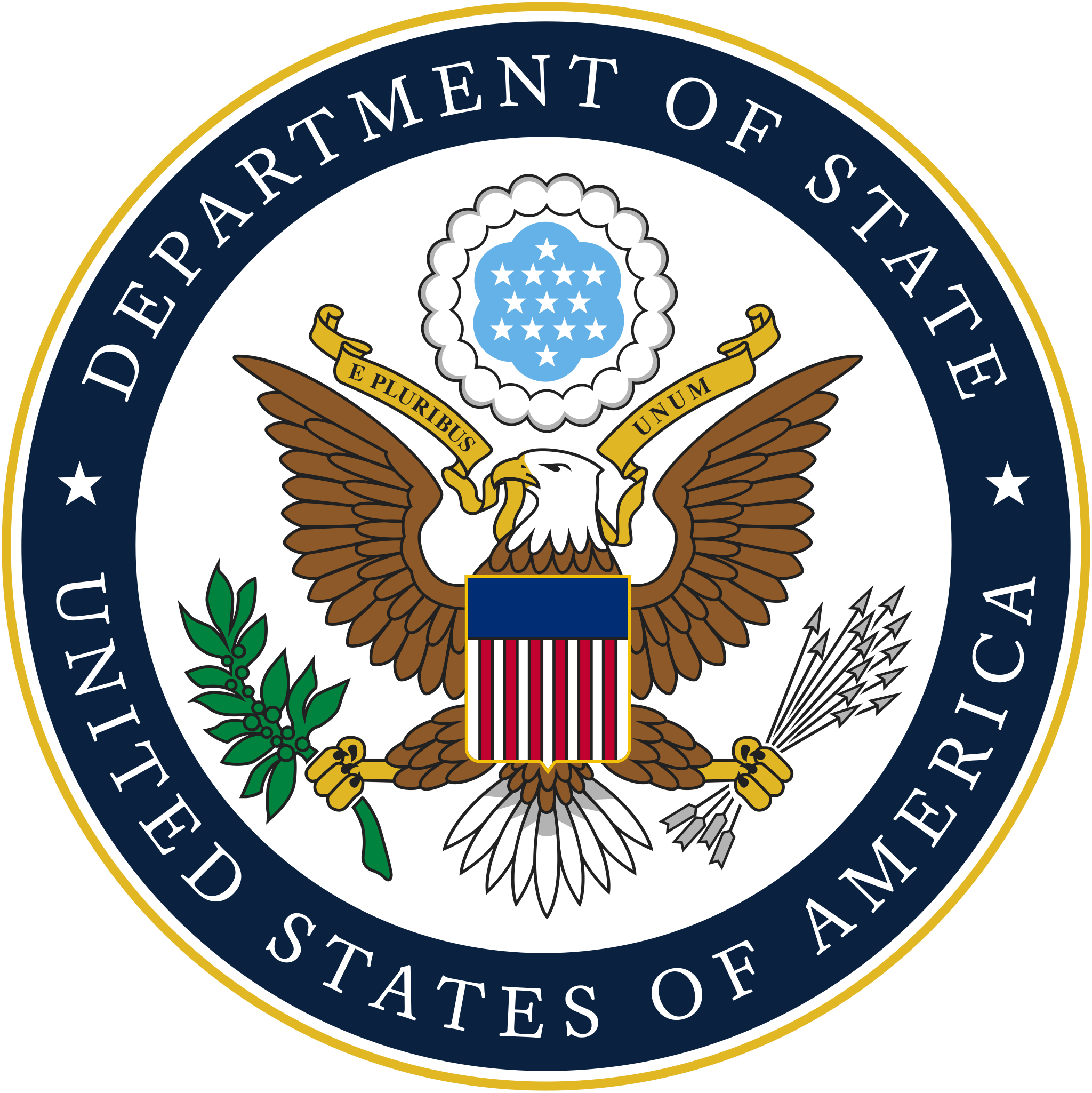Before an international student can join your family and settle into the local high school, there’s an essential step that makes it all possible: the exchange student visa.
For host families, the visa process might feel complicated. Which visa type do students need? What requirements must be met? How long can they stay? And most importantly, what role do you, as a host family, play in supporting the student’s visa status?
The good news is you don’t have to figure it all out alone! AYUSA, a U.S. Department of State–designated visa sponsor, has decades of experience guiding both students and host families through the exchange program process, including the visa application.
In this article, we’ll break down everything you need to know about exchange student visas, including the different types, eligibility requirements, application steps, and travel/work rules.
We’ll also explain how we help make the entire experience smooth and stress-free for host families, and how you can join AYUSA to welcome an exchange student into your home.
What Is an Exchange Student Visa?
An exchange student visa is a special type of visa that allows international students to live and study in the United States for a set period of time (usually a semester or an academic year). These visas are part of the U.S. Department of State’s cultural exchange programs, which are designed for education and mutual understanding between people from different countries.
For high school exchange students, the J-1 Exchange Visitor Visa is the most common. This visa allows students to attend an American high school, live with a host family, and fully immerse themselves in U.S. culture.
Why the Visa Matters to Host Families
While the exchange student visa belongs to the student, it plays an important role for the host family as well. Here’s why:
- Ensures legality and safety: A valid visa confirms that the student is in the U.S. legally, with government oversight. This gives families peace of mind that their hosting experience is supported and protected.
- Guarantees program oversight: With a J-1 visa, students must be sponsored by an organization like AYUSA. This means host families aren’t left on their own; the program provides training, resources, and ongoing support throughout the student’s stay.
- Defines boundaries and expectations: Visa rules outline what students can and cannot do while in the U.S., from how long they can stay to whether they’re allowed to work. Understanding these boundaries helps host families set clear expectations in the home.
- Connects families to a larger mission: Hosting foreign exchange students isn’t just about providing a room and meals, it’s about participating in a global cultural exchange. The visa ensures that this mission is backed by official U.S. policy and international goodwill.
Types of Exchange Student Visas in the U.S.
For high school international student exchange programs, there are two main visa types: the J-1 Exchange Visitor Visa and the F-1 Student Visa. While both allow students to study in the U.S., they serve different purposes.
J-1 Exchange Visitor Visa (Most Common)
Administered through the U.S. Department of State, the J-1 visa is specifically designed for students who want to study abroad in the USA for a year or semester while living with a host family.
Key points for host families to know:
- Focus on cultural exchange: Unlike visas that are strictly academic, the J-1 program emphasizes cultural sharing. Experiencing daily life with an American family is just as important to the program as learning in school.
- Sponsor organizations required: Students must work with an official visa sponsor like AYUSA, which means families receive training, resources, and ongoing support throughout the program.
- Time-limited stay: Students on J-1 visas typically attend school for one semester or one academic year, after which they return home.
- Restrictions on work: J-1 students aren’t permitted to work regular jobs or earn money while in the U.S.
F-1 Student Visa (Less Common in Exchanges)
The F-1 visa is another type of student visa, but it’s less common in traditional exchange programs. Instead, it’s designed for full-time international students who enroll directly in a U.S. school, often paying tuition at private schools.
What makes it different:
- Academic-first focus: The F-1 visa prioritizes academic study, with less emphasis on cultural exchange or living with host families during their academic year in America.
- Longer-term options: Students may study in the U.S. for multiple years if accepted by a school.
- Higher cost: Because students must often attend private schools and pay tuition, the financial commitment is much higher than with the J-1 program.
- Different work rules: F-1 students may sometimes work on campus (more common at the college level than high school), but restrictions are strict.
While the F-1 visa opens doors for students pursuing long-term education in the U.S., it doesn’t carry the same structured support or cultural exchange emphasis that J-1 host families enjoy through organizations like AYUSA.
Key Eligibility Requirements for J-1 Exchange Student Visas
Both the student and those hosting a high school exchange student must meet certain requirements to make sure the experience is positive, safe, and successful. These eligibility rules are set by the U.S. Department of State and carried out by sponsoring organizations like AYUSA. While students carry the visa itself, host families also play an important role in ensuring the program’s success.
For Students
To qualify for a J-1 visa and join an exchange student program, international students must meet specific criteria. These rules help ensure they are ready to thrive academically and socially in a new environment.
- Age range: High school exchange students are generally between 15 and 18 years old at the start of the program.
- Academic standing: Students must show a solid academic record in their home country. This demonstrates that they can keep up with coursework in an American high school.
- English proficiency: Students need to demonstrate sufficient English skills to participate in classes and daily life. AYUSA helps evaluate this before placement.
- Health requirements: A medical checkup and proof of health insurance are typically required, ensuring the student can safely live abroad.
- Background and character: Foreign exchange students are expected to be mature, adaptable, and willing to embrace a cultural exchange experience.
For Host Families
While the student needs the visa, host families also need to meet eligibility standards to provide a safe and welcoming home environment:
- Residency status: Anyone hosting an international student must be a U.S. citizen or legal permanent resident.
- Room and board: Families must provide the student with their own bed, meals, and a place to feel at home.
- Financial stability: Families should be financially able to support an additional family member, though they are not responsible for tuition, travel, or medical expenses.
- Background checks: All adult members of the household undergo background checks to ensure student safety.
- Willingness to participate: Families hosting international students must be open to cultural exchange, welcoming the student as part of their family, and supporting them throughout their stay.
The Exchange Student Visa Application Process
Sponsoring organizations like AYUSA guide international students and their families through the visa process step by step. This ensures that all paperwork, interviews, and requirements are handled properly, so host families can focus on welcoming their student rather than worrying about red tape. Here’s a breakdown of how the exchange student visa application process works:
Sponsorship Through AYUSA
For a student to obtain a J-1 visa, they must have an official sponsor recognized by the U.S. Department of State. AYUSA is one of these designated sponsors, which means:
- AYUSA issues key documents: Students cannot apply for a J-1 visa without a sponsoring organization providing them with the correct forms.
- Support from start to finish: AYUSA works directly with the student and their family overseas, handling details like eligibility checks, school placement, and program rules.
- Relief for host families: Since AYUSA takes care of the visa process, host families don’t have to navigate embassy systems or visa requirements themselves.
DS-2019 Form
The most important document in the visa process is the DS-2019 form, also known as the “Certificate of Eligibility for Exchange Visitor Status.” This form is issued by the sponsor (in this case, AYUSA) and confirms the student’s acceptance into the foreign exchange student program.
- Students cannot even schedule a visa interview without the DS-2019.
- The form outlines the purpose, duration, and details of the exchange program.
- It ensures that the student’s stay in the U.S. is legitimate and properly documented.
Host families don’t need to worry about this paperwork, as AYUSA prepares and provides the DS-2019 directly to the student.
The Visa Interview
After receiving the DS-2019, the student schedules a visa interview at the local U.S. embassy or consulate in their home country. During this appointment, a consular officer will:
- Verify the student’s eligibility for the J-1 visa.
- Ask questions about their program, school placement, and host family arrangements.
- Review the student’s financial, academic, and personal background.
For students, this is often one of the most nerve-wracking parts of joining a study abroad program. We provide visa preparation and guidance so they know what to expect, making it a lot less intimidating!
Fees and Processing Times
There are costs associated with the exchange student visa, but they are covered by the student’s family, not the host family. Processing times can vary depending on the country, embassy, and time of year, but most students receive their visa within a few weeks of their interview.
Life in the U.S. on an Exchange Student Visa
Once an exchange student arrives in the U.S. and joins your family, their visa shapes what their day-to-day life will look like. Understanding visa rules helps host families support their students while staying compliant with U.S. Department of State guidelines.
Duration of Stay
Students on a J-1 exchange visitor visa are typically approved to live and study in the U.S. for one academic semester or one full academic year. At the end of their high school exchange program in the USA, they must return to their home country. Extensions are not common, as the program is designed to be a temporary student cultural exchange, and not a path to long-term residency.
School Enrollment Rules
A core part of the J-1 exchange experience is attending an accredited American high school. Visa rules require that students:
- Be enrolled full-time in a U.S. high school.
- Participate in regular classes with American peers, rather than in special programs for international students.
- Follow school policies on attendance, grades, and conduct, just like local students.
At AYUSA, we coordinate each student’s high school placement. As a host family, you don’t need to worry about enrollment or working with a school to place your exchange student. Plus, our local Community Representatives (CRs) check in with students and schools throughout the academic year to make sure everything is going smoothly and provide any support we can.
Travel Within and Outside the U.S.
Exchange students are encouraged to explore U.S. culture, which often includes travel. Within the U.S., students can visit other states or take family vacations, as long as AYUSA is informed and approves the trip in advance.
For travel outside the U.S., the rules are stricter:
- Students must have prior approval from their sponsor (AYUSA).
- They need their DS-2019 form signed for travel authorization.
- Re-entry into the U.S. is only allowed while the visa is valid and the program is still in session.
Responsibilities of Host Families in the Visa Process
While the visa itself is handled primarily by the student, their family abroad, and our team at AYUSA, host families in the USA still play an important role in ensuring everything runs smoothly once the student arrives.
What Host Families Do (and Don’t) Handle
One of the biggest reliefs for host families is that you don’t need to complete or submit visa paperwork, and you won’t be asked to schedule embassy interviews, pay visa fees, or manage documentation.
What you do handle is equally important:
- Providing a welcoming, stable home environment.
- Supporting the student in adjusting to life in the U.S. and adhering to the rules of their J-1 visa.
- Communicating with AYUSA if challenges arise.
Basically, we take care of the logistics, while you focus on helping your student feel like part of the family.
Orientation and Support From AYUSA
Before your student arrives, AYUSA provides host families with orientation and training to explain:
- The basics of the J-1 visa program and what it means for your student.
- Cultural adjustment tips to help you welcome a teen from a different background.
- Do’s and don’ts around school, travel, and work permissions.
This training ensures you feel confident and prepared, even if you’ve never hosted before. Once your student arrives, we also provide ongoing support, including:
- Local CRs who check in regularly during the student exchange program.
- 24/7 support lines for emergencies.
- Resources for navigating common issues like homesickness or cultural differences.
You’re never on your own when you host through AYUSA!
Compliance and Reporting
Part of your responsibility as a host family is helping ensure the student remains in compliance with the terms of their visa. Don’t worry, it’s not as scary as it sounds! You’ll just need to:
- Inform AYUSA if the student travels outside the local area.
- Notify AYUSA of any major changes in the household (such as a move).
- Support the student in following school attendance and academic requirements.
The AYUSA Advantage in Hosting Exchange Students
Deciding to host a student is a big step, and choosing the right organization makes all the difference. From handling the complexities of the visa process to providing guidance throughout the year, AYUSA ensures hosting is a positive and rewarding experience for your entire family.
AYUSA as a Trusted Visa Sponsor
What makes AYUSA one of the best student exchange programs for host families is our status as a designated visa sponsor through the U.S. Department of State. This means we are authorized to issue the DS-2019 form (the essential document students need to apply for their J-1 exchange visa).
For families, this provides peace of mind: you’re working with an organization that meets strict federal requirements and has a long track record of success in placing students safely and responsibly.
Making Hosting Easy and Rewarding
We go beyond logistics by focusing on the human side of exchange, with:
- Thoughtful matching: Families are paired with students whose personalities, interests, and values align with their household.
- Clear guidelines: From school enrollment to everyday responsibilities, AYUSA provides straightforward guidance so expectations are clear.
- Local representatives: A nearby AYUSA community representative is assigned to every family, offering regular check-ins and help when needed.
- 24/7 support: Emergencies don’t follow a schedule, and AYUSA has a team available around the clock during your student’s exchange year in the USA.
Here’s what the Bray family has to say about their experience as an AYUSA host family:
“We’ve been hosting with Ayusa for 9 years, and while not every experience has been perfect (because real life rarely is!), the support we've received from our local coordinator and Regional Support Specialist has always been top-tier. They are the reason we’ve felt confident opening our hearts and home year after year.
What really sets Ayusa apart is the community. Our CRs go above and beyond — organizing activities not just for students but for host families too (Host Parent Night Out? Yes, please!). Those moments build real connections and lifelong memories.
We’ve hosted with other organizations in the past, but once we found Ayusa, we knew we found our people. The support, the heart, and the commitment to cultural exchange are unmatched.”
Common Questions About Exchange Student Visas
Here are some common questions host families for international students ask us about the visa process.
Do Host Families Need to Pay for the Visa?
No, host families are not responsible for visa costs. Exchange students and their natural families cover the expenses related to the J-1 visa, including application fees and interview costs. As a host family, your role is to provide a welcoming home, meals, and a supportive environment, not to handle or pay for the visa itself.
Can Students Stay Longer After Their Visa Ends?
In most cases, no. J-1 exchange students are authorized to stay in the U.S. only for the duration of their year-long or semester exchange program. Once the program ends, students must return home within the short grace period granted by their visa.
What Happens if Visa Rules Are Broken?
The U.S. Department of State takes visa compliance seriously. If an exchange student violates their visa rules, such as by working in an unauthorized job, skipping school, or overstaying their visa, their program can be terminated, and they may be required to leave the country immediately.
Ready to Welcome an Exchange Student? Join AYUSA Today!
For host families, navigating the visa process doesn’t have to be complicated. With AYUSA as your partner, you’ll have the confidence of working with a trusted, Department of State–designated sponsor that takes care of the details. That means less stress for you and more time to focus on welcoming your newest family member!
Ready to begin your hosting journey? Start your hosting application here to join the AYUSA family!




.jpg)







